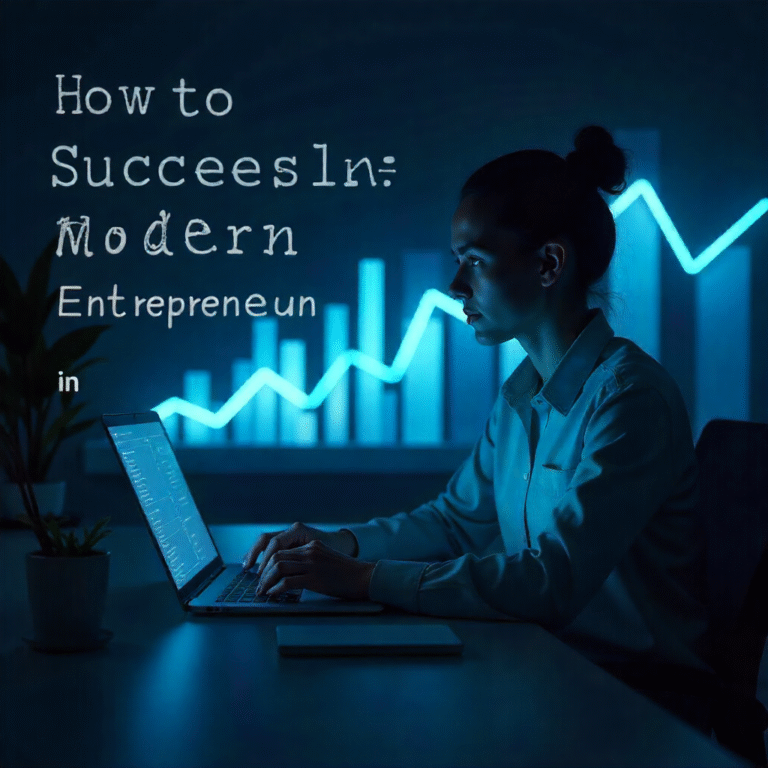Entrepreneurship in 2025: How Smart Founders Are Building the Next Big Thing

Introduction
Entrepreneurship in 2025 looks nothing like it did a decade ago. The rise of automation, AI tools, and digital-first markets has created a new playing field for founders. From solo creators building online empires to startups attracting millions in venture funding, the landscape of business ownership in the U.S. is more exciting—and competitive—than ever.
If you’re ready to start or grow your own business, understanding how smart founders are adapting in 2025 can give you a serious edge.
1. AI Is the New Co-Founder
Artificial intelligence is now at the core of modern entrepreneurship. Founders are using AI tools to automate marketing, improve customer experience, and even brainstorm business ideas.
Platforms like ChatGPT, Notion AI, and Jasper allow small teams to work faster and smarter without increasing overhead costs.
- Example: A solo e-commerce founder can now use AI to write ad copy, predict customer trends, and manage inventory in real time.
Pro Tip: Start integrating AI early—it’s no longer optional if you want to stay competitive.
2. Digital-First Businesses Are Dominating
In 2025, every business is an online business. From local boutiques to consulting firms, the most successful entrepreneurs are those who’ve built strong digital ecosystems—websites, email lists, content channels, and social communities.
Your digital presence is your storefront. A clean website, fast hosting, and consistent content can turn visitors into loyal customers.
👉 Related: Car Finance & Insurance 2025: Smarter Ways to Buy and Protect Your Vehicle in the U.S. — see how smart financing and protection can keep your assets safe while you scale your business.
3. Remote Teams Are the New Normal
The pandemic redefined work culture, and 2025 has fully embraced remote and hybrid models. Entrepreneurs are hiring global talent instead of limiting themselves to one city.
With platforms like Upwork, Slack, and Asana, startups can manage projects seamlessly across time zones. This flexibility not only cuts costs but also widens access to skilled professionals worldwide.
4. Sustainability and Purpose Drive Growth
Modern consumers care about more than just products—they want brands that stand for something. Entrepreneurs in 2025 are weaving sustainability and social impact into their business models.
Eco-friendly packaging, ethical sourcing, and transparent business practices are not just “nice to have”—they’re key to customer loyalty.
Tip: Highlight your brand’s mission clearly. Consumers love supporting founders who care about the planet and community.
5. Micro-Entrepreneurship Is on the Rise
The barrier to entry has never been lower. Thanks to affordable tools, even part-time creators can build real businesses. Side hustles are turning into six-figure brands through platforms like Shopify, YouTube, and Substack.
These micro-entrepreneurs often focus on niche audiences, building communities before scaling.
- Example: A small YouTuber focused on sustainable living can build an entire product line through crowdfunding and audience support.
6. Funding Is Shifting Toward Smart, Lean Startups
Venture capital isn’t drying up—but it’s evolving. In 2025, investors are looking for sustainable, lean startups that prioritize profitability over fast growth.
Alternative funding options like crowdfunding, angel investors, and revenue-based financing are giving founders more flexibility.
Pro Tip: Build a clear, data-driven business plan before seeking funding. Investors in 2025 expect founders to show how they’ll reach sustainability—not just scale.
7. Customer Experience Is the Ultimate Differentiator
Automation helps you scale, but personalization keeps customers. The best founders are blending data analytics and human touch to create memorable customer experiences.
Loyalty programs, email automation, and personalized recommendations are shaping the modern customer journey. In 2025, businesses that make customers feel valued will dominate.
8. Personal Branding = Business Branding
In 2025, people follow people, not just companies. Entrepreneurs who build strong personal brands—through LinkedIn posts, podcasts, or YouTube—are attracting more partnerships and loyal fans.
Think of Elon Musk, Gary Vaynerchuk, or Emma Grede: their personal reputations amplify their ventures. If you’re building a brand, invest time in your online presence as much as your product.
9. Collaboration Over Competition
Smart founders are collaborating with competitors instead of fighting them. Co-marketing campaigns, joint webinars, and partnership launches are helping entrepreneurs reach new audiences.
This shift toward community-driven growth reflects a maturing business ecosystem—where shared value often beats zero-sum competition.
10. Agility Is the New Superpower
Markets are moving fast. The founders winning in 2025 are those who can pivot quickly, experiment often, and respond to trends in real time.
Whether it’s adapting to new tech or shifting customer expectations, agility separates lasting businesses from short-lived ones.
Tip: Test small, learn fast, and double down on what works.
Conclusion
Entrepreneurship in 2025 is about being adaptive, innovative, and human-centered. Smart founders aren’t just chasing profits—they’re building meaningful, future-proof brands that combine technology with authenticity.
If you’re ready to build your own “next big thing,” start small, stay consistent, and embrace the tools shaping tomorrow’s economy.
For more insights on finance, investing, and business growth, visit Payziox.

